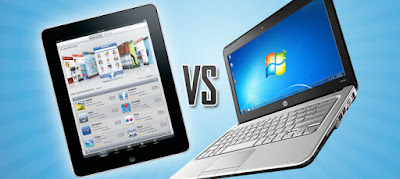Tablets have become quite popular because of their portability, easy to use interfaces and a large range of functions they can be used for. In several ways, Tablets can almost replace a laptop for someone on the go. But is a tablet a better choice over a traditional laptop? As there are lots of laptops which is known for its portability and have a much wider range of tasks they can be used for.
Here I will tell you the differences between tablets and laptops to see how they compare to one another and which is the best to buy.
Input Methods
The most considerable difference between a tablet and a laptop is the lack of keyboards. Tablets completely rely on a touchscreen interface for all inputs. This is good when it involves mainly pointing, dragging or tapping to navigate around a program. The problems arise when you have to input text into a program such as for an email or document. As they are lacking keyboards, users need to type using virtual keyboards that have varying layouts and designs. Most of the people are not able to type more accurately or more quickly on virtual keyboards. 2-in-1 designs that provide detachable keyboards for a tablet may improve the ability of typing text but they still generally fall short of the laptop’s experience as they are smaller in size and more restrictive designs.
Users with general tablets are able to add an external Bluetooth keyboard to make this similar to the laptops but it involves an extra cost.
Size
For many people, this is the main reason to go with a tablet rather than a laptop. Tablets possess the size roughly of a small pad of paper and a weight that is less than two pounds. Most laptops are far larger in size and heavier. Even one of the smallest ultraportables, the Apple MacBook Air 11 weighs just over two pounds and has a profile that is bigger than many tablets. The main reason for this is that the keyboards and trackpad which require it to be larger.Add in more powerful components that need additional cooling and power and they get even larger. Because of this, it is much easier to carry a tablet than a laptop especially if you are traveling.
Battery Life
The Best Tablets 2017 are designed for efficiency because of the low power requirements of the hardware components. In fact, the majority of the interior of a tablet is taken up by the battery. In addition, laptops require more powerful hardware, so the battery component of the laptop is far smaller percentage of the laptops internal component. Thus, even with a higher capacity battery for laptops, they do not run as long as a tablet can. Many of the tablets are able to run up to 10 hours of web usage before it requires a charger but the battery life of an average laptop is around 4-5 hours which is far less than that of tablets.
Storage Capacity
In order to keep their size and cost down, tablets have had to rely on new solid state storage memory as a means to store data and programs. While these have the potential for faster access and low power consumption, they have one big disadvantage in the amount of files they can store. Most tablets available in the market come with a configuration that allows between 16 and 128 gigabytes of storage. Whereas laptops still use a traditional hard drive that holds far much more. The average laptop comes with a 500GB hard drive. So if we are concern about the memory, Definitely, the laptop will be your priority.


No comments:
Post a Comment